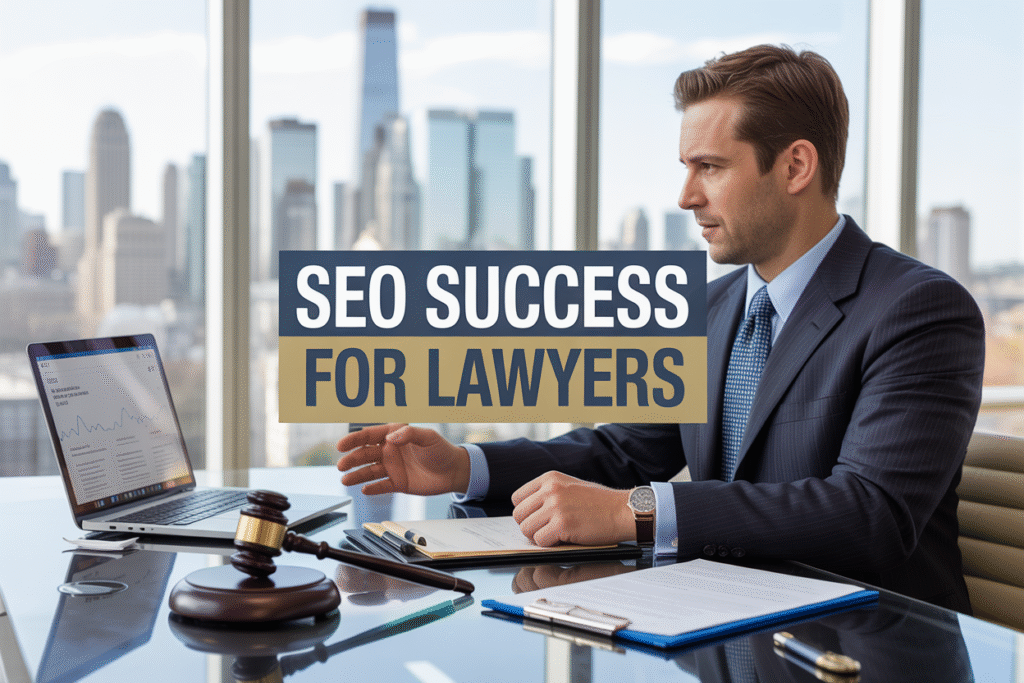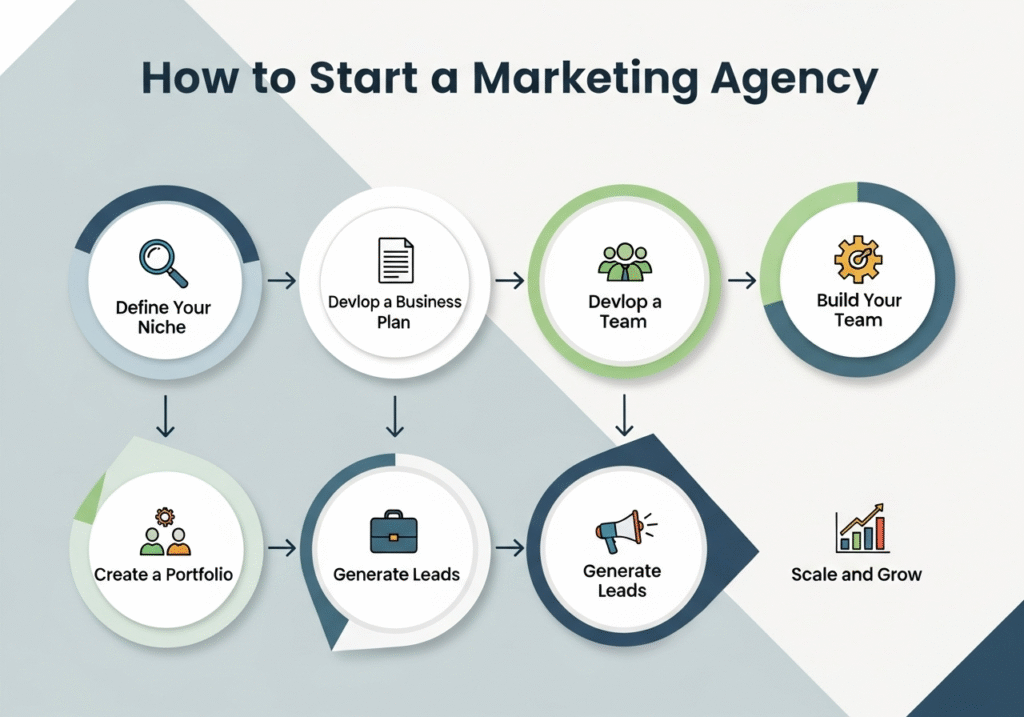Why does seo for personal injury lawyers matter? Personal injury lawyers face intense competition online, with potential clients searching for legal help every day. When someone gets hurt in an accident, they turn to Google first—not the phone book. That’s exactly why SEO for personal injury lawyers matters so much for building a successful practice.
This guide is for personal injury attorneys and law firm partners who want to attract more qualified clients through their website. Whether you’re a solo practitioner or part of a larger firm, you need to understand how search engine optimization can transform your client acquisition.
We’ll cover the digital challenges personal injury lawyers face in today’s competitive market and show you how proper SEO drives high-quality leads straight to your door.
You’ll also discover the essential SEO strategies that successful personal injury law firms use to dominate local search results and convert website visitors into paying clients.
The Digital Landscape Challenge for Personal Injury Lawyers

Increased Competition in the Legal Market
The personal injury legal landscape has become a battlefield. Thousands of law firms compete for the same clients in every major city, with new practices opening their doors regularly. This saturation means that even experienced attorneys with stellar track records struggle to stand out from the crowd.
SEO for Personal Injury Lawyers has become the great equalizer in this competitive environment. Small firms can now compete with established practices that have dominated the market for decades.
When potential clients search for legal representation, search engines don’t care about your office’s marble floors or how long you’ve been practicing – they care about relevance and authority in the digital space.
The numbers tell the story. In major metropolitan areas, dozens of personal injury firms battle for visibility on the same search terms. Without a solid Personal Injury Lawyer SEO strategy, even the most qualified attorneys risk becoming invisible to potential clients who never scroll past the first page of search results.
Clients’ Shift to Online Research Before Hiring
Modern clients don’t pick lawyers from Yellow Pages anymore. They conduct extensive online research before making any hiring decisions. Studies show that 96% of people seeking legal advice start their search online, and 74% of consumers visit a law firm’s website before making contact.
This digital-first approach means your online presence serves as your first impression. Potential clients form opinions about your competence, professionalism, and trustworthiness based on what they find online. If your website doesn’t appear in search results or looks outdated, you’ve lost the case before it begins.
Local SEO for Lawyers plays a critical role here. When someone searches for “personal injury lawyer near me” after an accident, they want immediate, relevant results. Google’s local pack displays only three businesses prominently, making top rankings essential for capturing these high-intent searches.
The Cost of Traditional Marketing vs Digital Marketing
Traditional marketing channels for law firms come with hefty price tags and questionable returns. Television ads, radio spots, and billboard campaigns can cost thousands of dollars monthly with no guarantee of reaching your target audience.
| Marketing Method | Average Monthly Cost | Targeting Precision | Measurable ROI |
|---|---|---|---|
| TV Advertising | $5,000-$20,000 | Low | Difficult |
| Radio Spots | $2,000-$8,000 | Medium | Limited |
| Billboard Ads | $3,000-$15,000 | Low | Nearly Impossible |
| Law Firm SEO | $2,000-$8,000 | High | Highly Measurable |
Digital marketing, particularly Attorney SEO Services, offers superior targeting and measurability. You can track exactly which keywords bring clients, how they interact with your website, and which content converts browsers into consultations.
This data-driven approach allows for continuous optimization and better budget allocation. The long-term value proposition makes SEO even more attractive. While traditional ads stop working the moment you stop paying, SEO builds cumulative authority.
A well-optimized website continues attracting clients months or years after the initial investment, creating sustainable growth that traditional marketing simply cannot match.
How To SEO Drives Quality Client Leads For Law Firms?

Targeting High-Intent Keywords That Convert
Personal Injury Lawyer SEO succeeds when it focuses on keywords that capture people actively seeking legal representation. Someone searching “car accident lawyer near me” or “slip and fall attorney” demonstrates immediate intent to hire a lawyer, unlike someone casually browsing “what is personal injury law.”
High-converting keywords typically include location modifiers and specific injury types. “Chicago truck accident lawyer,” “workers compensation attorney Dallas,” and “medical malpractice lawyer Boston” attract potential clients ready to make decisions.
These searchers often need legal help urgently and convert at much higher rates than generic traffic. Long-tail keywords prove especially valuable for Law Firm SEO because they face less competition while targeting specific situations.
“What to do after motorcycle accident injury” or “how much compensation for slip and fall” capture people researching their legal options and guide them toward consultation requests.
Smart attorneys also target question-based keywords that reveal someone’s stage in the decision process. “Do I need a personal injury lawyer” indicates someone considering legal representation, while “best personal injury lawyer reviews” suggests they’re ready to choose an attorney.
Capturing Clients at The Moment of Need
Personal injuries create immediate, urgent needs that send people straight to search engines. Unlike other legal matters that develop slowly, personal injury cases often begin with sudden accidents that leave victims confused and seeking immediate guidance.
When someone suffers a car accident, slip and fall, or workplace injury, they typically search for answers within hours or days of the incident. This creates a unique opportunity for Personal Injury Law Firm Marketing to connect with prospects when they’re most motivated to act.
SEO Strategies for Attorneys must account for this time-sensitive nature by ensuring visibility for emergency-related searches. “What to do immediately after car accident” or “steps to take after workplace injury” can capture potential clients before they contact competitors or make costly mistakes that hurt their cases.
The emotional state of injury victims also influences their search behavior. They’re often dealing with pain, stress, and financial concerns while navigating insurance companies and medical treatments. Attorneys who appear prominently for relevant searches can provide the guidance and reassurance these individuals desperately need.
Mobile optimization becomes critical since many injury-related searches happen on smartphones at accident scenes or from hospital beds. Local SEO for Lawyers ensures attorneys appear in “near me” searches when people need immediate legal assistance in their area.
Building Trust Through Search Engine Rankings
High search engine rankings signal credibility and expertise to potential clients who may know little about choosing an attorney. When law firms appear on Google’s first page for relevant searches, they automatically gain a trust advantage over competitors buried on later pages.
This trust factor becomes especially important for personal injury cases where clients must share intimate details about their injuries, finances, and personal lives with their attorney. People naturally associate top search rankings with professional competence and success.
Attorney SEO Services that focus on thought leadership content can enhance this trust-building effect. When lawyers consistently appear in search results with helpful articles, guides, and resources about personal injury law, they establish themselves as knowledgeable authorities rather than just advertisements.
Google’s E-A-T (Expertise, Authoritateness, Trustworthiness) algorithm particularly rewards legal content that demonstrates genuine expertise. Law firms that invest in high-quality, informative content often see improved rankings across all their target keywords.
Online reviews and testimonials also play a crucial role in converting search traffic into clients. When potential clients find a law firm through SEO and see positive reviews prominently displayed, the combination creates a powerful trust signal that encourages contact.
Generating Long-Term Sustainable Client Flow
Why Does SEO for Personal Injury Lawyers Matter becomes most apparent when examining long-term results. Unlike paid advertising that stops generating leads the moment you stop paying, effective SEO builds momentum over time and creates sustainable client acquisition systems.
Well-optimized websites continue attracting qualified prospects months and years after initial optimization work. This compound effect means Legal Marketing Strategies that prioritize SEO often deliver better return on investment than short-term advertising campaigns.
The sustainability factor proves especially valuable for personal injury practices because case referrals and word-of-mouth marketing take time to develop. SEO fills this gap by providing consistent lead flow while attorneys build their reputation and referral networks.
Seasonal trends in personal injury cases also make sustainable lead generation crucial. Car accidents peak during certain weather conditions, slip and falls increase in winter months, and workplace injuries fluctuate with industry patterns. SEO helps maintain steady case flow regardless of these natural variations.
| SEO Benefit | Short-Term Impact | Long-Term Impact |
|---|---|---|
| Keyword Rankings | Moderate | High |
| Trust Building | Low | Very High |
| Cost Efficiency | Moderate | Excellent |
| Lead Quality | Good | Excellent |
| Competitive Advantage | Moderate | Significant |
Investment in comprehensive Lawyer SEO Tips and strategies creates compounding returns that often exceed the results of any other marketing channel for personal injury attorneys.
Essential SEO Strategies That Personal Injury Lawyers Must Implement

Local SEO Optimization for Geographic Targeting
Personal injury lawyers need to dominate their local market since clients typically search for attorneys in their immediate area. Local SEO for lawyers starts with claiming and optimizing your Google Business Profile completely.
Upload high-quality photos of your office, add accurate business hours, and regularly post updates about your services. Your website needs location-specific landing pages for each area you serve.
Create dedicated pages for “Personal Injury Lawyer in [City Name]” and include local landmarks, neighborhood information, and community involvement. This helps search engines understand your geographic relevance.
Build local citations consistently across legal directories like Avvo, Martindale-Hubbell, and FindLaw. Ensure your name, address, and phone number (NAP) remain identical across all platforms. Inconsistent information confuses search engines and hurts your rankings.
Collect and respond to client reviews actively. Positive reviews from satisfied clients boost your local search rankings and build trust with potential clients. Address negative reviews professionally and promptly to maintain your reputation.
Target location-based keywords naturally throughout your content. Include phrases like “car accident attorney near me” or “personal injury lawyer in [your city]” in your website copy, blog posts, and meta descriptions.
Content Marketing That Addresses Client Pain Points
Personal injury clients arrive at your website confused, injured, and seeking answers. Your content should directly address their immediate concerns and questions. Create comprehensive guides explaining what to do after car accidents, workplace injuries, or slip-and-fall incidents.
Blog regularly about topics your clients actually search for: “How long do personal injury cases take?” “What’s my case worth?” “Should I accept the insurance company’s first offer?” These questions represent real search queries from potential clients.
Develop case study content showcasing successful outcomes without violating client confidentiality. Explain the legal process, challenges faced, and results achieved. This builds confidence in your abilities while providing valuable information.
Video content performs exceptionally well for personal injury law firm marketing. Create short videos answering frequently asked questions, explaining legal concepts in simple terms, or walking viewers through your office. Videos increase engagement and help potential clients connect with your personality.
Publish comprehensive resource pages covering different injury types you handle. Include symptoms, treatment options, legal rights, and when to contact an attorney. This positions you as an authority while capturing traffic for various injury-related searches.
Technical Website Optimization For Better User Experience
Your website’s technical performance directly impacts both search rankings and client conversions. Page speed matters tremendously – potential clients won’t wait for slow-loading pages when they need help urgently.
Optimize images, minimize code, and use reliable hosting to achieve loading times under three seconds. Mobile optimization isn’t optional anymore. Over 60% of legal searches happen on mobile devices. Your website must display perfectly on smartphones and tablets.
Test all contact forms, phone number links, and navigation menus on various devices regularly. Implement clear site navigation that helps injured visitors find information quickly.
Create logical menu structures with categories like “Practice Areas,” “Results,” “Resources,” and “Contact.” Include prominent contact information and call-to-action buttons on every page.
SSL certificates are essential for attorney websites handling sensitive client information. Search engines favor secure sites, and visitors need confidence their data stays protected when contacting your firm.
Optimize your website’s internal linking structure to help search engines understand your content hierarchy. Link related blog posts, connect practice area pages, and guide visitors toward conversion points naturally.
Create XML sitemaps and submit them to Google Search Console. This helps search engines discover and index your content more efficiently. Monitor your site’s performance through Search Console to identify technical issues before they impact rankings.
Measuring ROI and Client Acquisition Through SEO

Tracking Consultation Requests From Organic Search
Understanding where your potential clients come from is the foundation of measuring SEO success. Personal injury law firms need sophisticated tracking systems to monitor consultation requests that stem directly from organic search results.
Google Analytics 4 and Google Search Console provide the backbone for this tracking, showing which keywords drive the most valuable traffic to your website.
Setting up conversion tracking for consultation requests requires implementing goals that capture form submissions, phone calls, and chat interactions. Many personal injury lawyers overlook the importance of call tracking numbers specifically for organic visitors.
When someone finds your firm through a Google search and calls the number on your website, that conversion needs attribution to your SEO efforts, not just general marketing.
Heat mapping tools and user behavior analytics reveal how organic visitors interact with your site before requesting consultations. This data helps identify which pages, content pieces, and calls-to-action generate the highest conversion rates from SEO traffic.
Personal injury attorneys who track these metrics can optimize their websites to turn more organic visitors into paying clients. The most successful law firms create detailed reports showing consultation request sources, breaking down organic search performance by location, practice area, and device type.
This granular approach to tracking reveals patterns that can guide future SEO strategy decisions.
Calculating Cost Per Client Acquisition
SEO for personal injury lawyers requires a different approach to calculating client acquisition costs compared to traditional advertising methods. Unlike paid advertising where costs are immediate and obvious, SEO investments compound over time, making cost calculations more complex but ultimately more rewarding.
Start by tracking all SEO-related expenses over a 12-month period. This includes content creation, technical optimization, link building, local SEO management, and any SEO tools or software subscriptions. Many attorneys forget to include internal time spent on SEO activities or content approval processes.
Divide your total annual SEO investment by the number of clients acquired through organic search during the same period. This calculation provides your true cost per client acquisition through SEO efforts.
Most personal injury law firms discover their SEO cost per client drops significantly after the first year as their organic visibility compounds.
SEO Investment Tracking Table:
| Expense Category | Monthly Cost | Annual Total |
|---|---|---|
| Content Creation | $2,500 | $30,000 |
| Technical SEO | $1,200 | $14,400 |
| Link Building | $1,800 | $21,600 |
| Tools & Software | $300 | $3,600 |
| Total Annual Investment | $69,600 |
Compare this cost per client acquisition to other marketing channels. Personal injury lawyers often find that while SEO requires higher upfront investments, the long-term cost per client acquisition becomes significantly lower than paid advertising or traditional marketing methods.
Monitoring Case Value Generated From SEO Efforts
The real measure of SEO success for personal injury attorneys lies in the case value generated from organic search traffic. Tracking consultation requests is just the beginning – you need to follow these leads through to case resolution to understand true ROI.
Create a system that tags each client with their original source, whether organic search, paid ads, or referrals. This tagging system should follow clients through your case management software, allowing you to calculate the total settlement or verdict value generated from SEO-driven clients.
Personal injury cases can take months or years to resolve, making this tracking challenging but essential. Implement quarterly reviews of closed cases, calculating the total value generated from clients who originally found your firm through organic search.
Many attorneys discover that SEO-generated clients produce higher-value cases because they’re actively seeking legal representation rather than responding to advertisements.
Track these key metrics for SEO-generated cases:
- Average case settlement value
- Case resolution timeframe
- Client satisfaction scores
- Referral generation from these clients
- Repeat business potential
The most successful personal injury law firms find that organic search clients often result in higher-value cases because these individuals have typically researched their options thoroughly before making contact. They’re more likely to be serious about pursuing legal action and have realistic expectations about the legal process.
Comparing SEO Results to Paid Advertising Performance
Personal injury lawyers need to understand how their SEO performance stacks up against paid advertising to make informed budget allocation decisions. This comparison goes beyond simple cost per click versus cost per client metrics.
Start by analyzing the quality difference between clients acquired through organic search versus paid advertising. SEO-generated leads often demonstrate higher intent levels because they’ve found your firm through informational content or local searches.
Paid advertising leads might be more immediate but could also be less qualified or more price-sensitive.
Performance Comparison Framework:
| Metric | SEO Performance | Paid Advertising |
|---|---|---|
| Cost per Lead | $180 | $95 |
| Lead to Client Conversion | 22% | 14% |
| Average Case Value | $85,000 | $62,000 |
| Cost per Client | $818 | $679 |
| Lifetime Client Value | $95,000 | $70,000 |
Track the long-term value of clients from each channel. SEO-generated clients often provide more referrals and have higher lifetime values because they’ve built trust with your firm through content consumption before making initial contact.
Consider the sustainability factor when comparing channels. Paid advertising results disappear immediately when you stop spending money, while SEO benefits compound over time.
Personal injury attorneys who invest consistently in SEO often find their organic traffic continues generating qualified leads even during periods of reduced marketing activity.
The timing element also differs significantly between channels. Paid advertising provides immediate results but requires constant investment, while SEO builds momentum gradually but creates lasting competitive advantages.
Smart personal injury law firms use both channels strategically, relying on paid advertising for immediate lead generation while building long-term organic visibility through consistent SEO efforts.
Common SEO Mistakes That Cost Personal Injury Lawyers Clients

Neglecting Mobile Optimization and Page Speed
Personal injury lawyers who skip mobile optimization are essentially turning away potential clients at the door. More than 60% of people searching for legal services use their smartphones, especially during emergencies or accidents.
When someone gets injured in a car crash, they’re not rushing home to their desktop computer – they’re pulling out their phone right at the scene. Page speed matters just as much as mobile-friendly design.
Google gives preference to websites that load quickly, and users abandon sites that take more than three seconds to load. If your law firm’s website crawls along at a snail’s pace, you’re losing clients to competitors who invested in faster hosting and optimized images.
The fix is straightforward: ensure your website uses responsive design that adapts to any screen size, compress images without losing quality, and choose reliable hosting. Test your site regularly on different devices and use tools like Google PageSpeed Insights to identify bottlenecks.
Overlooking Google My Business Management
Your Google My Business profile serves as your digital storefront, yet many personal injury lawyers set it up once and forget about it. This neglect costs them valuable local visibility and client trust.
When people search for “personal injury lawyer near me,” Google pulls information from these profiles to display in local search results. Incomplete or outdated information drives potential clients straight to your competitors.
Missing business hours, wrong phone numbers, or lack of photos make your firm appear unprofessional or closed. Regular updates to your Google My Business profile signal to Google that your practice is active and relevant.
Keep your profile current with accurate contact information, recent photos of your office and team, and regular posts about your legal expertise. Respond to questions promptly and post updates about your practice areas and community involvement.
This consistent attention to your Google My Business listing directly impacts your local SEO for lawyers and helps you appear in the coveted local map pack.
Creating Generic Content Instead of Practice-Specific Material
Cookie-cutter content kills your chances of ranking for valuable search terms. Many personal injury law firms publish generic blog posts about “types of injuries” or “what to do after an accident” without addressing specific client concerns or local legal nuances.
This approach fails to establish expertise and doesn’t answer the real questions potential clients are asking. Search engines reward content that demonstrates deep knowledge and serves user intent.
When someone searches for “slip and fall lawyer,” they want specific information about premises liability, not a general overview of personal injury law. Your content needs to drill down into the details of your practice areas.
Create targeted content around specific case types you handle, such as truck accident settlements in your state, workplace injury claims, or medical malpractice procedures.
Include local legal requirements, statute of limitations specifics, and examples from your experience. This practice-specific approach helps you rank for long-tail keywords that convert better than generic terms.
Ignoring Online Reviews and Reputation Management
Online reviews function as digital word-of-mouth recommendations, yet many personal injury lawyers don’t actively manage their online reputation. Negative reviews left unaddressed can destroy your credibility, while a lack of recent positive reviews suggests your practice isn’t actively helping clients.
Potential clients read reviews before choosing legal representation, and they often skip lawyers with poor ratings or sparse feedback. Your reputation management strategy should include actively requesting reviews from satisfied clients, responding professionally to all feedback, and addressing legitimate concerns promptly.
Set up Google Alerts for your firm’s name to monitor mentions across the web. Encourage happy clients to leave reviews on Google, Avvo, and other legal directories.
When you receive negative feedback, respond professionally and offer to resolve issues privately. This proactive approach to reputation management protects your practice and builds trust with potential clients who see how you handle both praise and criticism.

Personal injury law is more competitive than ever, and your online presence can make or break your practice. SEO isn’t just another marketing buzzword—it’s your lifeline to connecting with people who desperately need your help during their most vulnerable moments.
When someone gets hurt and searches for legal representation, you want to be the first name they see, not buried on page three of Google results. The lawyers who invest in proper SEO strategies, track their results, and avoid costly mistakes are the ones building thriving practices while others struggle to fill their calendars.
Start by focusing on local search optimization, creating helpful content that answers real questions, and making sure your website actually converts visitors into clients. Your future clients are searching for you right now—make sure they can find you.



